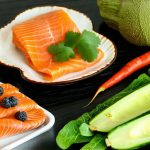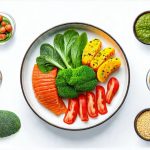Plant-based eating has exploded in popularity, and for good reason. Beyond ethical considerations and environmental benefits, many people are drawn to the perceived health advantages of reducing or eliminating animal products. However, a common complaint – and often a deterrent – is digestive discomfort: bloating, gas, and generally feeling unwell after a plant-focused meal. This isn’t inherent to plant-based diets themselves; rather, it’s frequently due to how those plants are prepared and combined. A beautifully crafted vegan feast can quickly become an evening of discomfort if certain factors aren’t considered.
The key lies in understanding that many plant foods, while incredibly nutritious, contain compounds that can cause digestive upset for some individuals. High-fiber vegetables, legumes, cruciferous veggies (like broccoli and cauliflower), and even healthy fats – when consumed in large quantities or without proper preparation – can lead to bloating. This doesn’t mean avoiding these foods; it means learning how to incorporate them into your diet in a way that supports optimal digestion and minimizes discomfort. It’s about mindful choices, smart cooking techniques, and understanding your own body’s unique sensitivities. If you are struggling with this, consider exploring are daily salads making you bloated.
The Fiber Factor & Smart Carb Choices
Fiber is undeniably good for us – it aids in gut health, regulates blood sugar, and promotes satiety. However, a sudden increase in fiber intake can overwhelm the digestive system, leading to gas and bloating. This is particularly true if you’re transitioning from a low-fiber diet. The same applies to complex carbohydrates found in beans and certain vegetables; these take longer to digest, potentially causing fermentation in the gut which produces gas. – Start slowly: Gradually increase your fiber intake over several weeks, allowing your body time to adapt. – Focus on soluble fiber: Foods like oats, apples, and carrots are gentler on the digestive system than insoluble fibers found in wheat bran or some vegetables. – Pair carbs with protein & fat: Combining complex carbohydrates with sources of protein and healthy fats slows down digestion and reduces the likelihood of rapid fermentation. For example, quinoa (complex carb) with tofu (protein) and avocado (fat).
Beyond quantity, the type of carbohydrate also matters. Some individuals struggle with FODMAPs – Fermentable Oligosaccharides, Disaccharides, Monosaccharides, And Polyols – which are short-chain carbohydrates that are poorly absorbed in the small intestine. This leads to fermentation and potential bloating. Common high-FODMAP plant foods include onions, garlic, apples, pears, stone fruits, beans, and wheat. Identifying your personal FODMAP triggers (potentially through an elimination diet under the guidance of a healthcare professional) can significantly improve digestive comfort. Understanding your carbohydrate tolerance is crucial for enjoying plant-based meals without discomfort. Sometimes it’s not the food itself but are you tolerating foods that harm long term which can cause issues.
Prepping Plants For Easier Digestion
Many plants contain compounds that are easier to digest after proper preparation. Legumes, notorious for causing gas, benefit immensely from soaking and thoroughly cooking. Soaking reduces the levels of phytic acid, which inhibits nutrient absorption and can contribute to bloating. Similarly, cruciferous vegetables release sulfur-containing compounds during digestion, which some people find difficult to tolerate. – Blanching or lightly steaming these veggies before adding them to a dish can reduce their potency. – Sprouting grains and legumes also increases digestibility by breaking down complex carbohydrates.
Cooking methods play a significant role too. Raw vegetables are often harder to digest than cooked ones. Gentle cooking methods like steaming, sautéing, or roasting tend to be more easily tolerated than frying or heavily processed foods. Don’t underestimate the power of spices! Ginger, turmeric, cumin, and fennel seeds have been traditionally used to aid digestion and reduce bloating. Incorporating these into your meals can not only enhance flavor but also improve digestive comfort. Simple preparation techniques are often all that’s needed to transform a potentially bloating meal into a nourishing one. A good first step might be looking at morning beverages that don’t upset your delicate gut.
The Power of Probiotics & Gut Health
A healthy gut microbiome is essential for optimal digestion and reduced bloating. Probiotics – beneficial bacteria found in fermented foods – can help balance the gut flora and improve digestive function. – Incorporate probiotic-rich foods into your diet: Sauerkraut, kimchi, tempeh (fermented soybeans), and plant-based yogurts are excellent sources. – Consider a probiotic supplement: If you struggle to get enough probiotics through food, a high-quality supplement may be beneficial (consult with a healthcare professional before starting any new supplements).
Beyond probiotics, prebiotics – fibers that feed the good bacteria in your gut – also play a crucial role. Foods like garlic, onions, asparagus, and bananas contain prebiotics. However, remember that some prebiotics are high-FODMAP, so balance is key (see previous section). A diverse microbiome is a resilient microbiome, able to handle a wider range of foods without causing discomfort. If your body often feels betrayed by digestion, living peacefully with a body that sometimes betrays you can offer helpful perspectives.
Hydration & Mindful Eating Practices
Dehydration can exacerbate bloating and digestive issues. Drinking enough water throughout the day helps keep things moving smoothly through your digestive system. Aim for at least eight glasses of water daily, or more if you’re physically active. – Sip water between meals rather than during to avoid diluting digestive enzymes.
Mindful eating is another powerful tool for reducing bloating. Pay attention to how quickly you’re eating and chew your food thoroughly. This breaks down the food into smaller particles, making it easier for your body to digest. Avoid distractions while eating (like watching TV or scrolling through social media) so you can focus on your meal and recognize fullness cues. Slowing down and savoring each bite allows your digestive system to work more efficiently. To help with this, consider simple snacks that don’t upset sensitive stomachs.
Food Combining & Personalized Approaches
While there’s no one-size-fits-all approach, food combining principles can be helpful for some individuals. The idea is that certain food combinations are easier to digest than others. For example: – Avoid combining large amounts of fruit with protein or starchy carbohydrates. Fruit digests quickly, while proteins and carbs take longer, potentially leading to fermentation in the gut. – Separate legumes from cruciferous vegetables whenever possible.
Ultimately, the best way to find out what works for you is to pay attention to your body’s signals. Keep a food diary to track which foods cause bloating or discomfort, and experiment with different preparation methods and combinations. Remember that everyone is unique, and what triggers bloating in one person may not affect another. Listen to your body, be patient with the process, and focus on creating a plant-based diet that nourishes you both physically and mentally. If you’re unsure about what’s happening inside, what that frequent belly rub might be telling you can help identify underlying issues. You may also want to consider feeding schedules that don’t overwhelm small stomachs.


















